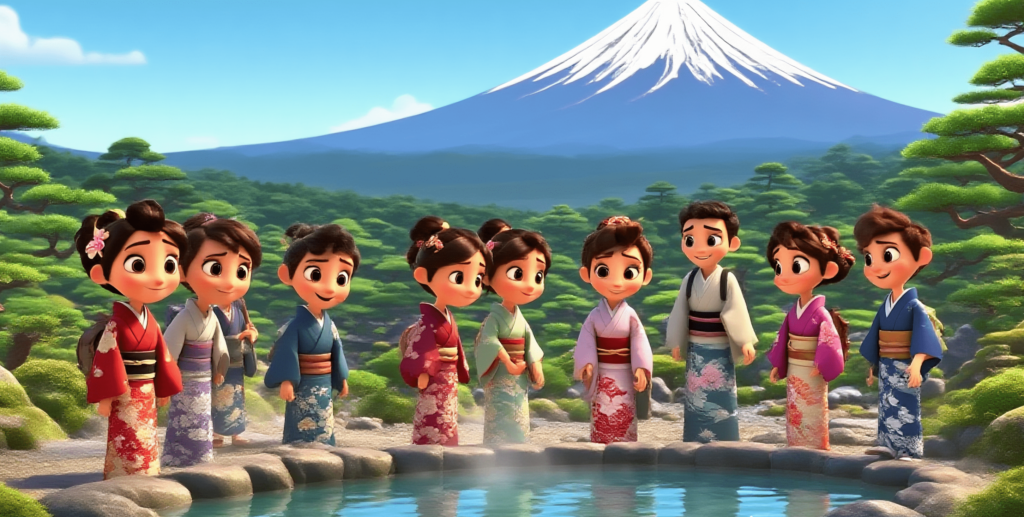A Soothing Dive into Tradition

Introduction:
In the land of the rising sun, amidst the majestic landscapes and ancient traditions, lies an experience that transcends mere relaxation: the Japanese onsen. These natural hot springs have been revered for centuries for their healing properties and serene ambiance, drawing visitors from around the world to immerse themselves in their soothing embrace.
A Glimpse into Tradition:
The tradition of soaking in hot springs, or “onsen,” traces back centuries in Japanese culture. Historically, these natural geothermal baths were revered for their medicinal benefits, believed to alleviate various ailments and promote overall well-being. Today, while the therapeutic aspects remain central, onsen have also become synonymous with relaxation and cultural immersion.
Nature’s Gift:
What sets Japanese onsen apart is their connection to nature. Nestled amidst breathtaking landscapes, from snowy mountains to lush forests and coastal cliffs, these hot springs offer an unparalleled sensory experience. The mineral-rich waters, heated by volcanic activity deep beneath the earth’s surface, are believed to possess healing properties, making each soak a rejuvenating journey for both body and soul.
Healing Benefits:
Beyond the relaxation they provide, Japanese onsen are renowned for their therapeutic benefits. The mineral composition of the waters varies from region to region, with each spring boasting its own unique blend of minerals such as sulfur, calcium, and magnesium. These minerals are believed to alleviate muscle pain, improve circulation, and promote skin health, offering a holistic approach to wellness.
Rituals and Etiquette:
Partaking in an onsen experience is not merely about bathing; it’s a ritual steeped in tradition and respect. Before entering the hot springs, visitors must cleanse themselves thoroughly in communal washing areas, a practice known as “ofuro.” This ritual cleansing is not only about hygiene but also symbolizes purification of the mind and spirit.
Once cleansed, bathers can enter the onsen, where they are encouraged to immerse themselves fully, allowing the mineral-rich waters to work their magic. Silence is often observed, adding to the tranquil atmosphere, as guests unwind and let go of the stresses of everyday life.
Types of Onsen:
Japanese onsen come in various forms, each offering a unique experience. “Rotenburo” are outdoor hot springs, allowing bathers to soak amidst nature’s splendor, whether under the stars or surrounded by autumn foliage. “Konyoku” onsen are mixed-gender baths, though they have become less common in modern times. For those seeking ultimate relaxation, “ryokan”—traditional Japanese inns—often feature private onsen, where guests can enjoy the therapeutic waters in seclusion.
Cultural Significance:
More than just a leisure activity, onsen hold deep cultural significance in Japan. They are places of social gathering, where friends and families come together to relax and reconnect. Throughout history, onsen have also served as settings for important meetings and negotiations, their tranquil ambiance fostering open communication and mutual respect.
Preserving Tradition:
Despite the modernization of Japan, the tradition of onsen remains cherished and protected. Many hot springs are located within national parks or designated conservation areas, ensuring the preservation of their natural beauty for generations to come. Additionally, efforts are made to maintain the authenticity of the onsen experience, with traditional ryokan and public bathhouses continuing to thrive across the country.
Conclusion:
In a fast-paced world where stress and tension abound, the Japanese onsen offers a sanctuary of serenity and healing. Rooted in centuries-old tradition and nestled amidst breathtaking natural landscapes, these hot springs provide a rejuvenating escape for body, mind, and spirit. Whether soaking under the open sky or cocooned in the warmth of a private bath, the allure of the onsen beckons travelers to immerse themselves in its timeless embrace, forging a connection with nature and tradition that transcends the ordinary.






